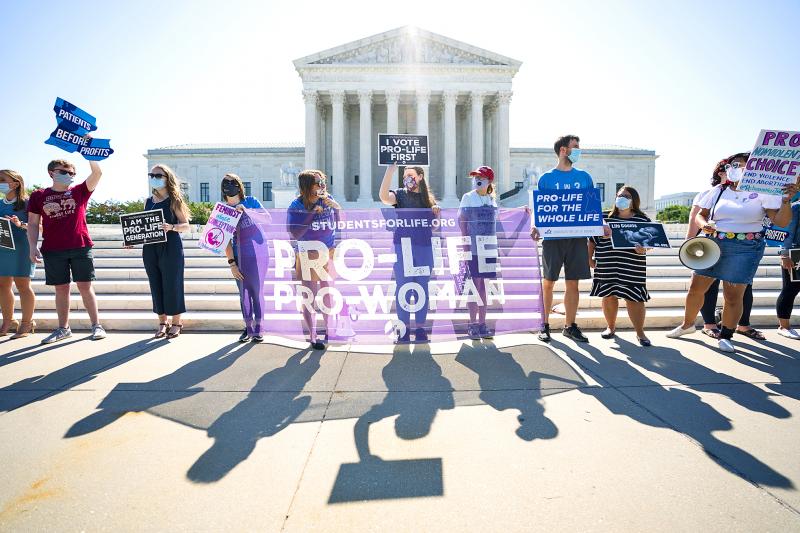The US Supreme Court on Monday struck down a Louisiana law that tightly restricted access to abortion in the first constitutional test of abortion rights since US President Donald Trump named two conservative justices to the top court.
In a key victory for abortion rights activists, the justices voted 5-4 to overrule a state law that requires doctors who perform abortions to have admitting privileges at a nearby hospital.
The Louisiana law “would drastically reduce the number and geographic distribution of abortion providers, making it impossible for many women to obtain a safe, legal abortion in the state,” the ruling said.

Photo: EPA-EFE
Right-leaning Chief Justice John Roberts sided with the court’s four progressives, frustrating abortion opponents who had hoped that Trump’s appointments had tilted the high court firmly in their direction.
However, Roberts gave them hope that a different challenge to abortion rights might succeed in the future in the conservative court.
He said his decision to join with the progressives in the case, June Medical Services v Russo, was strictly on institutional grounds, and not because he believed the Louisiana law was unconstitutional.
Instead, Roberts said that he was not prepared to reverse the precedent set by the court’s 2016 decision — made before Trump’s justices arrived — rejecting an identical Texas law.
Roberts said he continues to believe that the Texas case was wrongly decided.
The White House sharply criticized the decision, saying that “unelected justices” intruded on the powers individual states have to set policies.
“In an unfortunate ruling today, the Supreme Court devalued both the health of mothers and the lives of unborn children,” White House press secretary Kayleigh McEnany said in a statement.
“States have legitimate interests in regulating any medical procedure — including abortions — to protect patient safety,” she said.
Supporters of the Louisiana and previous Texas laws had argued that clinics providing abortion services had substandard health and safety practices, an argument pro-abortion groups said was false.
Both sides saw the Louisiana case as a test of the court’s view of abortion as a constitutional right.
Abortion foes have in their sights the landmark 1973 Roe v Wade case, in which the Supreme Court legalized a woman’s right to an abortion.
“Today’s decision reaffirmed that states can’t put in place laws that unduly burden a woman’s right to make her own health care decisions — but the fight isn’t over,” former US vice president Joe Biden tweeted.
Robert’s view of the actual Louisiana law, along with the four other conservative justices who opposed the decision, suggests that the court has a potentially decisive five votes supporting other restrictions on abortion.
Center for Reproductive Rights president Nancy Northup said they were relieved that the court blocked the Louisiana law.
“With this win, the clinics in Louisiana can stay open to serve the 1 million women of reproductive age in the state,” she said in a statement.
“Unfortunately, the court’s ruling today will not stop those hell-bent on banning abortion,” she said.

Kehinde Sanni spends his days smoothing out dents and repainting scratched bumpers in a modest autobody shop in Lagos. He has never left Nigeria, yet he speaks glowingly of Burkina Faso military leader Ibrahim Traore. “Nigeria needs someone like Ibrahim Traore of Burkina Faso. He is doing well for his country,” Sanni said. His admiration is shaped by a steady stream of viral videos, memes and social media posts — many misleading or outright false — portraying Traore as a fearless reformer who defied Western powers and reclaimed his country’s dignity. The Burkinabe strongman swept into power following a coup in September 2022

‘FRAGMENTING’: British politics have for a long time been dominated by the Labor Party and the Tories, but polls suggest that Reform now poses a significant challenge Hard-right upstarts Reform UK snatched a parliamentary seat from British Prime Minister Keir Starmer’s Labor Party yesterday in local elections that dealt a blow to the UK’s two establishment parties. Reform, led by anti-immigrant firebrand Nigel Farage, won the by-election in Runcorn and Helsby in northwest England by just six votes, as it picked up gains in other localities, including one mayoralty. The group’s strong showing continues momentum it built up at last year’s general election and appears to confirm a trend that the UK is entering an era of multi-party politics. “For the movement, for the party it’s a very, very big

ENTERTAINMENT: Rio officials have a history of organizing massive concerts on Copacabana Beach, with Madonna’s show drawing about 1.6 million fans last year Lady Gaga on Saturday night gave a free concert in front of 2 million fans who poured onto Copacabana Beach in Rio de Janeiro for the biggest show of her career. “Tonight, we’re making history... Thank you for making history with me,” Lady Gaga told a screaming crowd. The Mother Monster, as she is known, started the show at about 10:10pm local time with her 2011 song Bloody Mary. Cries of joy rose from the tightly packed fans who sang and danced shoulder-to-shoulder on the vast stretch of sand. Concert organizers said 2.1 million people attended the show. Lady Gaga

SUPPORT: The Australian prime minister promised to back Kyiv against Russia’s invasion, saying: ‘That’s my government’s position. It was yesterday. It still is’ Left-leaning Australian Prime Minister Anthony Albanese yesterday basked in his landslide election win, promising a “disciplined, orderly” government to confront cost-of-living pain and tariff turmoil. People clapped as the 62-year-old and his fiancee, Jodie Haydon, who visited his old inner Sydney haunt, Cafe Italia, surrounded by a crowd of jostling photographers and journalists. Albanese’s Labor Party is on course to win at least 83 seats in the 150-member parliament, partial results showed. Opposition leader Peter Dutton’s conservative Liberal-National coalition had just 38 seats, and other parties 12. Another 17 seats were still in doubt. “We will be a disciplined, orderly